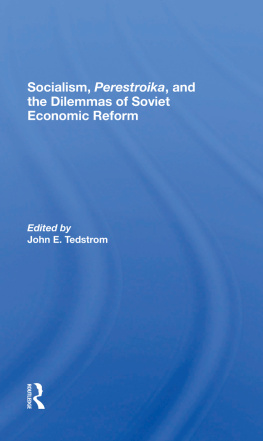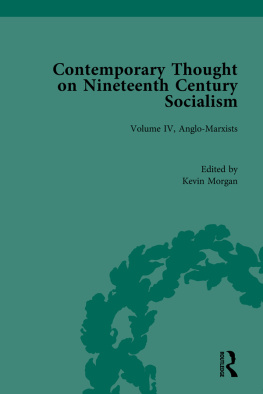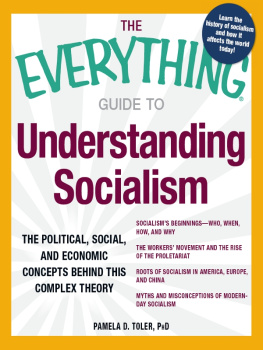PREFACE.
Table of Contents
In the present edition the original work has not only been carefully revised, but very considerably enlarged. The chapters on "The Progress and Present Position of Socialism" and "Russian Nihilism" contain a few sentences retained from the first edition, but otherwise they are entirely newthe former necessarily so on account of the nature of its subject, and the latter on account of the importance of the fresh materials that have been recently given to the world. A new chapter has been added on "Anarchism," and another, of considerable extent, on "State Socialism." No apology is required for the length of the latter, for though State socialism is only a growth of yesterday, it has already spread everywhere, and if it is not superseding socialism proper, it is certainly eclipsing it in practical importance, and to some extent even modifying it in character. Revolutionary socialism, growing more opportunist of late years, seems losing much of its old phrenzy, and getting domesticated into a shifty State socialism, fighting a parliamentary battle for minor, though still probably mischievous, changes within the lines of existing society, instead of the old war l'outrance against existing society in whatever shape or form. Anyhow the socialistic controversy in the immediate future will evidently be fought along the lines of State socialism. It is there the hostile parties meet, and it is well therefore to get, if we can, some more exact knowledge of the ground. Some of the other chapters in the work have been altered here and there for the purpose of bringing their matter, where necessary, down to date, or embodying fresh illustrative evidence, or occasionally of making the exposition itself more lucid and effective; but it is unnecessary to specify these alterations in detail.
April, 1891.
CHAPTER I. INTRODUCTORY.
Table of Contents
It was a common topic of congratulation at the Exhibition of 1862 that the political atmosphere of Europe was then entirely free from the revolutionary alarms which overclouded the first Exhibition in 1851; but in that very year the old clouds began to gather once more at different quarters of the horizon. It was in 1862 that Lassalle delivered to a club of working men in Berlin his address on "The Present Epoch of the World, and the Idea of the Working Class," which was published shortly afterwards under the title of "The Working Man's Programme," and which has been called by his friends "The Wittenberg Theses" of the new socialist movement; and it was at the Exhibition itself that those relations were established between the delegates of English and French trade societies which issued eventually in the organization of the International. The double train thus laid has put in motion a propaganda of social revolution more vigorous, widespread, and dangerous than any which has preceded it.
But though the reappearance of socialism was not immediately looked for at the time, it could cause no serious surprise to any one who considered how nearly the socialist theory is allied with some of the ruling ideas of modern times, and how many points of attraction it presents at once to the impatient philanthropy of enthusiasts, to the passions of the multitude, and to the narrow but insistent logic of the numerous class of minds that make little account of the complexity of life. Socialism will probably never keep long away during the present transitional period of society, and there is therefore less interest in the mere fact of its reappearance than in marking the particular form in which, after a prolonged retirement, it has actually returned; for this may perhaps be reasonably taken to be its most vital and enduring type, and consequently that with which we shall mainly have to reckon in the future.
Now the present movement is, before all, political and revolutionary. The philanthropic and experimental forms of socialism, which played a conspicuous rle before 1848, perished then in the wreck of the Revolution, and have never risen to life again. The old schools have dispersed. Their doctrines, their works, their very hopes have gone. The theories of man's entire dependence on circumstances, of the rehabilitation of the flesh, of the passional attraction, once in everybody's mouth, have sunk into oblivion. The communities of Owenites, St. Simonians, Fourierists, Icarians, which multiplied for a time on both sides of the Atlantic, are extinct. The socialists of the present day have discarded all belief in the possibility of effecting any social regeneration except by means of political authority, and the first object of their endeavours is therefore the conquest of the powers of the State. There are some exceptions, but these are very unimportant. The communistic societies of the United States, for instance, are mostly organizations of eccentric religious sects which have no part or influence in the life of the century. The Colinsian Collectivists, followers of the Belgian socialist Colins, are a mere handful; and the Familistre of Guise in Francea remarkable institution, founded since 1848 by an old disciple of Fourier, though not on Fourier's planstands quite alone, and has no imitators. Non-political socialism may accordingly be said to have practically disappeared.
Not only so, but out of the several sorts and varieties of political socialism, only one has revived in any strength, and that is the extremest and most revolutionary. It is the democratic communism of the Young Hegelians, and it scouts the very suggestion of State-help, and will content itself with nothing short of State-transformation. Schemes such as were popular and noisy thirty years agoschemes, involving indeed organic changes, but organic changes of only a partial characterhave gone to their rest. Louis Blanc, for example, was then a name of some power; but, remarkably enough, though Louis Blanc was but the other year buried with great honour, his Organization of Labour seems to be as completely forgotten as the Circulus of Leroux. M. G. de Molinari writes an interesting account of the debates that took place in the working men's clubs of Paris in the year 18689the first year they were granted liberty of meeting after the establishment of the Second Empireand he states that while Fourier and Cabet were still quoted by old disciples, though without any idea of their systems being of practical moment, Louis Blanc's name was not even mentioned. Proudhon's gospel of a State bank of mutual credit for furnishing labourers with capital, by issuing inconvertible notes without money and without price, has still a sprinkling of faithful believers, who call themselves Mutualists; but they are extremely few, and, as a rule, the socialists of France at the present day, like those of Germany, put their faith in iron rather than paper. What they want is a democracy of labour, to use one of their own phrasesthat is, a State in which power and property shall be based on labour; where citizenship shall depend on a labour qualification, instead of a qualification of birth or of property; where there shall be no citizen who enjoys without labouring, and no citizen who labours without enjoying; where every one who is able to work shall have employment, and every one who has wrought shall retain the whole produce of his labour; and where accordingly, as the indispensable prerequisite of the whole scheme, the land of the country and all other instruments of production shall be made the joint property of the community, and the conduct of all industrial operations be placed under the direct administration of the State. Furthermore, all this is contended for as a matter of simple right and justice to the labouring classes, on the ground that the wealth of the nation belongs to the hands that made it; it is contended for as an obligation of the State, because the State is held to be merely the organized will of the people, and the people is the labouring class; and it is contended for as an object of immediate accomplishmentif possible, by ordinary constitutional means; but, if not, by revolution.















